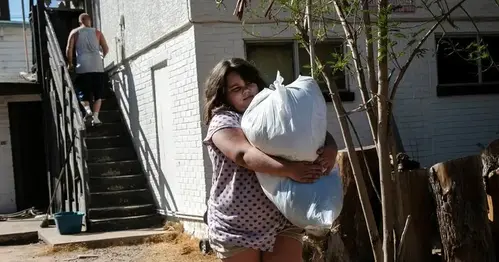
Rental evictions impact kids, Black women, Latinos, study finds
Those most at risk of facing eviction proceedings and having to move out of their rental homes are infants and young children, according to a new analysis by The Eviction Lab and the U.S. Census Bureau that, for the first time, tallies the number of people threatened.
“What we realized is that children are the population most impacted by evictions. If you have children in your home, the odds of you being a victim of eviction are much higher," said Juan Pablo Garnham, head of communications and policy at The Eviction Lab, in an interview with Noticias Telemundo.
"We found that 2.9 million children under the age of 18 are threatened by eviction processes every year, which is a huge number,” he said.
Of those children who are threatened by eviction, about 1.5 million, or 2 in 5 who face this threat receive an eviction judgment.
The recent study offers the most complete demographic picture of those living in rental housing and facing eviction proceedings, after researchers linked hundreds of thousands of eviction requests with detailed records from the U.S. Census Bureau.
“We were able to access official census data and the results are chilling numbers: We now know that, on average, 7.6 million people are threatened with eviction each year," Garnham said. "This is data taken from 2007 to 2016 but, with the exception of when the pandemic eviction moratorium was implemented, the numbers remain fairly constant."
Racial disparities, Latinos' hidden numbers
According to the report, “adult renters living with at least one child in their home were threatened with eviction at an annual rate of 10.4%, compared to 5.0% for those without children."
The gap was "particularly pronounced for Black women," the data found, where filing rates were 28% with children present and 16% for those without children.
“Despite the fact that fewer than 1 in 5 renters in the United States are Black, about half of all evictions are against Black people, and that obviously includes Afro Latinos,” Garnham said.
Black–white disparities persisted across levels of income, though it varied by state.
Although eviction rates among Hispanics tend to be below 5%, which is sometimes even lower than non-Latino whites, Garnham warned that this number is far from accurate.
“Because this data comes from the courts, from the formal eviction processes," he said, "it doesn’t contemplate the informal evictions that are often applied to the undocumented Hispanic population — and we believe that this figure must be enormous."
It's estimated there are around 11 million undocumented people in the country.
“In our study, because of the way we are linking people to census records, we can only focus on people who have a Social Security number," Nick Graetz, one of the study's authors, said. "So we don’t take into account undocumented immigrants, for example, as well as other people who have less contact with the different government systems. It’s very difficult to see what those communities are going through."
According to Eviction Lab researchers, many Hispanics, especially those with family members who lack legal status, don't go through formal judicial or legal processes when they get an eviction notice, so they end up being evicted informally without any legal or judicial record.
Consequences for children
“We were only given a month to get out of the apartment. We had lived there for about a year-and-a-half, but from one day to the next the owner said that the city had asked him to make arrangements and that it was urgent,” said Maria, who lives in Irvine, California, and whose last name is being withheld as she is still processing her legal work permit.
“I have a 5-month-old baby girl, but I still don’t have papers so I had to go into debt so I could get another house and get out on time. Now I owe $6,500,” says Maria, 26, originally from Puebla, Mexico.
“An eviction is not only a judicial process and a piece of paper, but it is something that has an impact on your life on many levels: health, economic, school performance and mental health. There are many people who tell us that a child doesn’t forget this and that it impacts them for a long time,” Garnham said.
In recent years, researchers have shown that adverse childhood experiences can have lifelong consequences for health, education and employment.
Housing instability before age 5 can lead to delays in kindergarten readiness and is associated with attention and behavioral problems and delays in cognitive abilities in school. Teens are more likely to suffer from depression and anxiety and to have difficulty processing information.
“Since a month ago, my life became hell because the owner of the apartment sent us a letter asking us to vacate,” explains Patricia Montes, 36, who works as a teacher’s aide for children with special needs.
Montes lives with her mother, Josefina Sandoval, who is 68 and works cleaning houses in Costa Mesa, California. “We’ve lived in this apartment for 35 years and all of a sudden we see that all over the neighborhood they’re buying up properties, evicting tenants and then just painting and raising rents so much, I don’t know what we’re going to do,” Sandoval said despondently.
Montes said that since she is a citizen and her mother has a work permit, they have not been afraid to ask for legal help and advice to get the time they need to get a new place or reach an agreement with the landlord.
“We know this is an injustice, in reality, what worries me most are my children. I am a single mother of a 17-year-old girl and an 11-year-old boy and all this affects them a lot. It makes them anxious, and they don’t want to leave their friends at school or in the neighborhood. This is very sad,” Montes said.
Housing instability can affect children’s well-being by causing them to experience other stressors, such as food insecurity and issues with health care coverage.
Rising rents
According to The Eviction Lab, in the 10 states and 34 cities for which the research has real-time data, landlords have filed more than 86,000 eviction petitions in the past month, and that number rose just over 1 million in the past 12 months.
While high housing prices mean that homeownership is no longer a possibility for many Americans, experts say rising rents are making it harder for renters to pay, which is leading to more eviction filings by landlords.
“In my neighborhood there are companies that are buying apartment buildings and using the pretext that they are going to make repairs to the housing and that’s why people have to leave. But when you ask at city hall, those companies didn’t apply for any permits to fix anything, and what they do is paint the units and then rent them out much more expensively,” said Mario Fonseca, 30, an IT specialist in Costa Mesa California.
According to a September report from Zillow, the average rent in the U.S. is now $2,050, up 3.3% from last year.
Costa Mesa community leader Juana Casas said some renters are duped by landlords. “One health promoter was evicted after she had been living in the same apartment for 25 years. She was told that the city had declared the apartments uninhabitable, but that was a lie,” she said.
According to Casas, many move out without claiming their rights as tenants.
The National Low Income Housing Coalition (NLIHC) points out in a recent report that a full-time worker would need to earn $28.58 per hour to rent a two-bedroom apartment, which is well above the national minimum wage of $7.25.
More low-income workers are paying high rents as they struggle with wages that are not keeping pace with inflation and amid the end of pandemic programs that helped them stay afloat.
The U.S. also faces a shortfall of 7.3 million affordable rental housing units for extremely low-income renters (incomes at or below the federal poverty line or 30% of area median income), NLIHC reports.
"I learned a long time ago that no one is going to come to help us if we don’t claim our rights," Casas said. "That’s why we have to fight."






